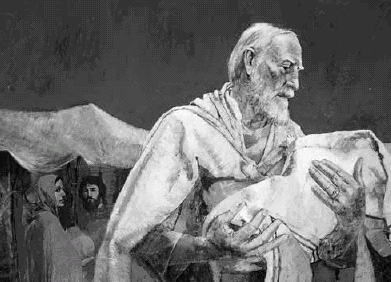 From what we read below, in my post Faith, Healing, Prayer, and Miracles in the Gospels, we see a few things that stick out:
From what we read below, in my post Faith, Healing, Prayer, and Miracles in the Gospels, we see a few things that stick out:Jesus in a couple of places gives a dual structure: in the first point "as you have believed (πιστεύω)," in the second, "so let it be to you" (cf. Matt. 8:13; 9:29).
Many other times, Jesus says, "ἡ πίστις σου σέσωκέ σε," that is, "The (ἡ) faith (πίστις) of you (σου) has healed (σέσωκέ) you (σε)" (Matt. 9:22; Mark 5:34; 10:52; Luke 8:48; 17:19; 18:42).
Other examples we hear: "great is your faith; let it be to you as you desire" (Matt. 15:28); "If you are able to believe, all things are possible to the ones believing" (Mark 9:23); "Do not fear; only believe and she will be healed" (Luke 8:50).
On the reverse side of this we hear from Matthew and Mark, of the same account, what happened when people did not believe Jesus' witness: "He did not do many works of power there because of their unbelief" (Matt. 13:58); "He could do no work of power there, except He performed healing on a few infirm ones, laying on His hands" (Mark 6:5).
We also see examples where we are led to believe that if one has faith, that one can do great things:

We read the account of Peter who, when asked to step out on the water, loses faith and starts sinking; Jesus says, "Little-faith, why did you doubt?" (Matt. 14:31).
We hear of the account of the disciples not being able to exorcize a demon; they ask, "Then coming up to Jesus privately, the disciples said, Why were we not able to cast him out? And Jesus said to them, Because of your unbelief" (Matt. 17:19-20).
Jesus says that if we had faith of a mustard seed we would be able to move mountains and throw them into the sea, curse fig trees and have them dry up, uproot sycamore trees and plant them in the sea (cf. Matt. 17:20; 21:21; Mark 11:23; Luke 17:6).
 Jesus also tells us, "All things, whatever you ask, praying, believe that you will receive, and it will be to you" (Mark 11:24; cf. Matt. 21:22). As James (and James 8^j) reminds us, "If any of you lacks wisdom, let him ask God, who gives generously to all without reproach, and it will be given him. But let him ask in faith, with no doubting, for the one who doubts is like a wave of the sea that is driven and tossed by the wind. For that person must not suppose that he will receive anything from the Lord; he is a double-minded man, unstable in all his ways" (1:5-8).
Jesus also tells us, "All things, whatever you ask, praying, believe that you will receive, and it will be to you" (Mark 11:24; cf. Matt. 21:22). As James (and James 8^j) reminds us, "If any of you lacks wisdom, let him ask God, who gives generously to all without reproach, and it will be given him. But let him ask in faith, with no doubting, for the one who doubts is like a wave of the sea that is driven and tossed by the wind. For that person must not suppose that he will receive anything from the Lord; he is a double-minded man, unstable in all his ways" (1:5-8).I'm not concerned with the "miraculousness" of these examples, this is beside the point. What I want to get at is whether or not this portrayal of faith is the same as the Pauline portrayal and the Lutheran understanding of faith?
As for the second part of the question, whether this is consistent with the Lutheran understanding of faith, I think the answer is, unfortunately, no. As Lutherans, we often have a knee jerk reaction to anything that might make faith out to be a work. This is good, as far as it goes, but it often 1) doesn't get the full picture, and 2) leaves us scratching our heads when confronted with such verses from the Gospels. Lutherans say that faith is purely passive, and it is, but when we look at these examples things seem to get a little muddled. We can only be healed if we have faith? If, and only if, we have enough faith we can 1) walk on water, 2) exorcize demons, 3) throw mountains into the sea, 4) get what we pray for? Lutherans usually don't like talking about faith in a qualitative way; we talk about faith as that which receives God's grace of forgivness and salvation, and it would seem, nothing more. Indeed, this is certainly St. Paul's emphasis on his teachings on faith. But is it the whole story?
As far as a qualitative understanding of faith, we as Lutherans ask: How can it all remain a gift from God (i.e. healing, water-walking, mountain-throwing, etc.) if it becomes dependent on something qualitative in me, that is, faith? For this reason we simply say: faith is faith is faith, it is purely a gift from God. The problem is when we read in the Gospels, and it is brought into question: is it enough faith for healing? enough faith for walking on water? enough faith for exorcizing demons? enough faith for my prayer to be answered? We say in response: "If God wants to ______ he will do it, it is not dependent on me, he is certainly powerful enough. If he WANTS to do it, who am I to change his mind?"
In younger days when faced with this question I settled it in my mind, saying simply that: sometimes God makes the choice only to heal/answer prayer/etc. when there is an expression of faith. That is, sometimes he just heals to heal, while at other times he chooses to heal those who have a strong faith. So what Jesus would essentially be saying is: "I decided, this time, to heal you because of your faith." Just as he might have said at another time: "I decided to heal you because of your love/hope/(insert virtue here)."
This answer, though, simply does not fly. First off, why does Jesus repeat, "your faith has healed you," over, and over, and over? Secondly, why faith? Why does Jesus continually say "faith," not love, not hope, not ____? This second question is the kicker for me. It becomes clear that faith is not an arbitrary choice by Jesus, easily replacable by any other virtue. So the first major question, which we will get back to, is, why faith?
A second problem is: Yes, okay, faith. But certainly God heals/answers prayers/etc. in certain situations even without strong faith, right? He is not bound by our faith, right? And the more disturbing question: "God's not holding back on me, not answering my prayer/healing me/etc., because of a lack of faith, is he?" These can be very disastrous questions for people. They are questions, also, that don't have a ready answer in any given situation because, simply, we don't know the mind of God. My own general answers to these questions would be as follows: 1) Yes, God can and does do these things even without strong faith. 2) No, God is not bound by our faith. 3) We don't know the mind of God; it may not be his will to answer your prayer, etc., in the first place.
 All of these questions, though, miss the point. They also miss the point of, why faith? They are questions that are focussed on me, not on God and his promises.
All of these questions, though, miss the point. They also miss the point of, why faith? They are questions that are focussed on me, not on God and his promises.Paul Althaus once wrote (I'm not sure where), "I do not know whether I believe, but I know in whom I believe, and only thus do I know that I believe." The answer is God and his promises through his Word and Sacraments. What needs to be understood is that the basic and originally intended structure of our relationship before God was in God's self-giving through his Word and our receiving through the open hands of faith. This is a pretty basic understanding for Lutherans and is fundamental to understanding Paul: "We have also obtained access by faith into this grace in which we stand" (Rom. 5:2). Therefore, whenever God gives through the open hands of our faith, this is a restoration of God's original will for creation. We see then, when Jesus says, "your faith has healed you," he is affirming the structure which God originally intended.
But the fact that God desires to give through faith does not mean that we should internalize everything and begin to wonder if we have enough faith; undoubtedly the answer we will find is, no, we don't. The point of faith is the promise, not ourselves. We repeat with Althaus: "I know in whom I believe, and only thus do I know that I believe." Left to ourselves we will never have a satisfactory answer. For this reason we look to the promises of God, including faith itself. We therefore pray with the apostles, "Give us more faith" (Luke 17:5); and elsewhere, "Lord, I believe! Help my unbelief!" (Mark 9:24). Or, as Luther put it, "Pray God that he may work faith in you. Otherwise you will surely remain forever without faith, regardless of what you may think or do." (LW 35:371)
A proper understanding of all the examples cited at the beginning is to understand not faith, but promise. If it was a failed faith, Jesus says: "what about my promise?" (e.g. Peter walking on the water, or the disciples' inability to cast out a demon); or, if it was strong faith, we clearly see displayed the faith these people had in Jesus' witness and promise (e.g. "Your faith has healed you).
It is only when we realize that we can accomplish nothing of ourselves, that all the fear and torment of self-reflection and internalization ceases. Faith itself is a product of God's promise through the Word, not of ourselves. As Werner Elert characterized it, faith is an "infinite resignation." We need to realize that we are just like the sick coming to Jesus. They had absolutely no power over their situations--they were infirm, poor, and had no hope that anything would better  their lot-- all they had was a promise of a man who was healing the sick.
their lot-- all they had was a promise of a man who was healing the sick.
 their lot-- all they had was a promise of a man who was healing the sick.
their lot-- all they had was a promise of a man who was healing the sick.May we all become more like Abraham, the father of faith, who "did not stagger by unbelief at the promise of God, but was empowered by faith, giving glory to God, and being fully persuaded that what [God] has promised, He is also able to do" (Rom. 4:20-21).




2 comments:
Thanks for your effort to explain faith. I don't claim to understand it all. I just trust the Lord and cling to the Cross. I know from the word of God that His word never returns void.
Thanks, Jim. My intent was to show how the same faith that receives salvation and the forgivness of sins can be the same faith that receives healing, answered prayers, the ability to cast out demons, and other feats.
I agree. In the end, all we are left with is God's Word alone. That's it! "The grass withers; the flower fades; but the Word of our God shall rise forever."
Post a Comment